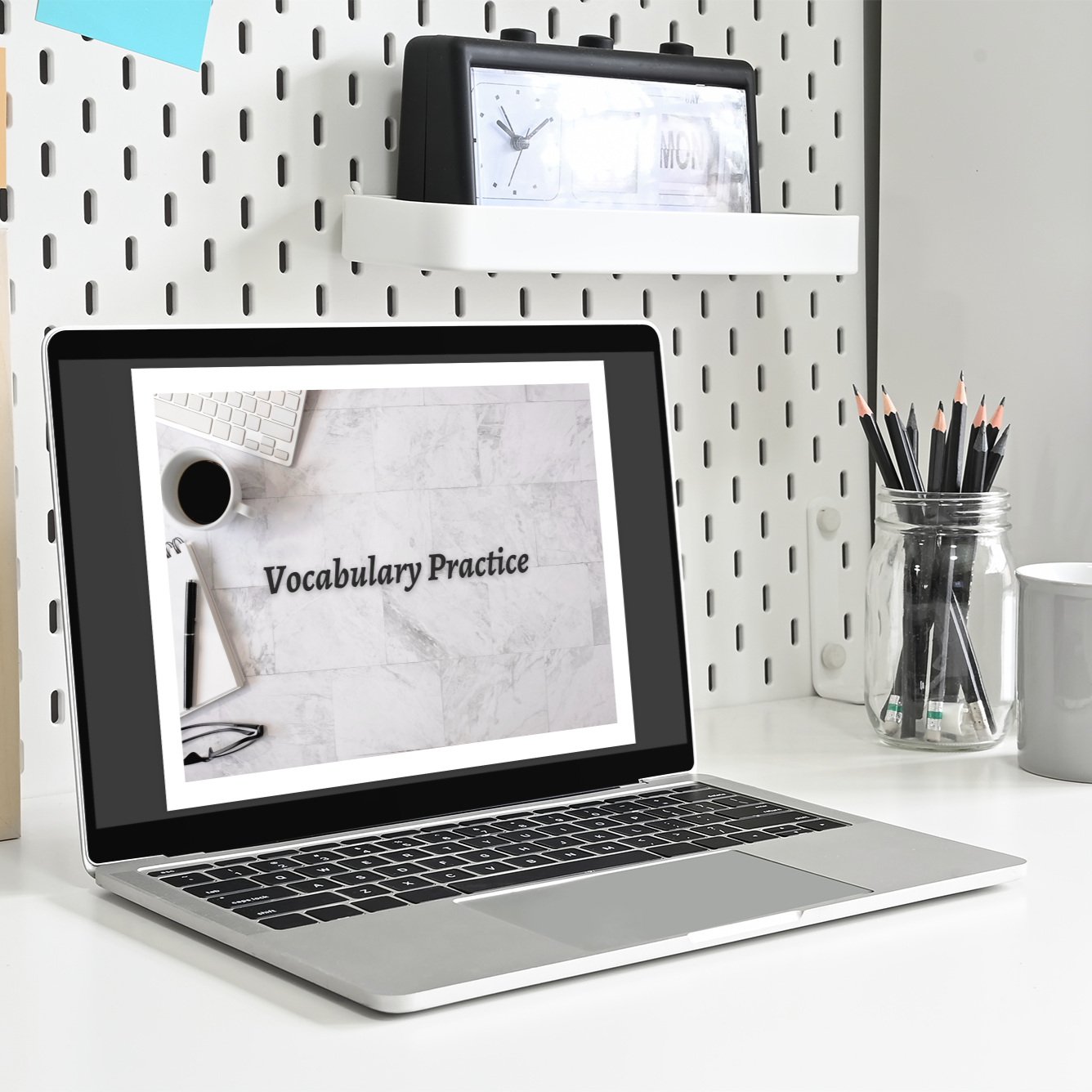Why Are Phrasal Verbs Important?
Mastering phrasal verbs is one of the biggest challenges you will face as an English learner. And if you’re at a point where you’re considering giving up on learning phrasal verbs, you’re not alone. I get the frustration, there’s a lot to take in.
BUT is learning phrasal verbs really worth the effort? Yes, absolutely.
So, why are phrasal verbs important?
They’re important because English speakers use phrasal verbs all the time. They are extremely common in conversations, and that makes them essential to mastering the language.
Part of their bad reputation comes from ineffective and boring learning approaches but look at it this way: Phrasal verbs will help you express yourself with a lot more ease. That’s simply because sometimes using a phrasal verb is the only way to express an idea.
Teaching English Just Got Easier!
Save hours of time with an organized collection of high quality, easy-prep ESL lesson plans and worksheets right at your fingertips!
The Importance of Learning Phrasal Verbs
“Should I just give up on phrasal verbs and move on?”
Before we move forward, I’ll give you the short answer: No, you should never give up on learning phrasal verbs. Having said that, let me tell you the story behind this question.
In my first year as an English teacher, I struggled so much with making phrasal verbs appealing to my English class that I started to hate them as much as my students did. Are they really that important? I started wondering.
One day I gave the kids an exercise to revise the phrasal verbs they were learning, and only 10% passed! A huge failure for me as a new teacher, or so it felt.
As it often happens with teachers, I couldn't stop thinking about this issue even after I left school and got home. I remember that night, my boyfriend was watching a movie and I spotted hundreds of phrasal verbs in the dialogues. The same thing happened later that night when I was going through my feed on social media, and the next morning during a meeting with some colleagues from the U.S. I was working for at the time.
If you pay attention when consuming any English content, you’ll notice it too. These are not just isolated cases. My point is, what if I had a teacher who thought phrasal verbs were not relevant to my education?
Phrasal verbs are essential for English fluency
I believe that bilingualism is a superpower. I was fully aware of the advantages of speaking English fluently and the opportunities it brought along, and I wanted that for my students. But how could that ever be possible if I offered them only a fragmented picture of that language? It was not fair.
So, this is how I finally embraced the study of phrasal verbs in my classes. But If you still need stronger reasons, let’s consider the following ones:
You’ll notice that you’re understanding English conversations more easily.
Using phrasal verbs will help you sound more natural when speaking in English.
You’ll learn how English is actually spoken.
1. You will notice that you’re understanding English conversations more easily
So, you’ve been studying English for a while and have a good handle on the language, but you still get the sense that you’re falling short with your listening skills. You may recognize the actual words you’re hearing, but they don’t make any sense together and you cannot grasp their meaning.
That’s because in spoken English, tons of phrasal verbs are used, and to understand the actual meaning of what is said, you need to know what the phrasal verbs mean.
Phrasal verb basics
Let’s go over some grammar points quickly:
Phrasal verbs consist of a verb plus a particle that may be a preposition or an adverb. In some cases, they may even contain more than two words (e.g. come down to, catch up with)
For the vast majority, their meanings cannot be inferred from knowing the definition of individual words separately
And to make things more complicated, one can have multiple meanings.
Quite challenging for sure!
I’m not going to tell you learning phrasal verbs won’t require time and effort. But try to think of it as a learning investment and I promise you, it will pay off.
Do you want to understand the dialogues in movies, the lyrics of songs, Instagram’s lives from your favorite artists? Do you want to follow a conversation without feeling you’re missing a great deal of what people are saying?
If your answer is yes, then you cannot take phrasal verbs out of the picture. Otherwise, you would definitely be missing out on the meanings of so many essential expressions.
2. You will sound more natural in English
A common problem that English learners struggle with is sounding overly formal in casual conversations. But if you want to speak English comfortably, you’ll need to learn how to vary your vocabulary according to the context. Because phrasal verbs are a typical feature of the spoken English language, understanding and using them appropriately makes a huge difference.
Understanding what a phrasal verb means but struggling to actually use it is another common issue with English learners. If you’re finding it difficult to incorporate phrasal verbs while having a conversation, your fluency might be affected. And that in turn might affect your confidence to communicate as well.
So, don’t let that happen. Just keep trying. Mastering phrasal verbs will not happen overnight but I can tell you from experience, it’s 100% achievable.
What’s the best way to learn phrasal verbs?
We’ve covered some useful tips in another post, but one of the best ways to learn phrasal verbs is to choose 4-7, and practice them until you’re comfortable. Don’t overwhelm yourself with a massive list and make sure the phrasal verbs you choose are practical and relevant to your current needs. In other words, do not waste time on business-related words if you’re learning English to travel. You can also focus on a theme such as, emotions or relationships and target a number of phrasal verbs related to that.
Phrasal Verb Demon is a great website where you can see examples of sentences with the phrasal verbs in context. Then, come up with examples you can relate to. To check if the examples are correct and relevant, take them to your teacher or language partner. You could also do a quick search on Google to see if the phrasal verb is commonly used the way you structured it. A powerful technique that will help you remember them is to make a connection between what you write and your emotions or experiences. It might be a short paragraph or even a little story about something that has happened to you recently.
3. You’ll learn how English is actually spoken
Let me share a funny story with you. I have this friend who studied English at school and also attended English classes with a private tutor. He has a good knowledge of the language, and he’s familiar with phrasal verbs even though he wasn’t confident enough to use them. My friend went on a trip to North Carolina recently, and the first time he had the chance to make some small talk, he noticed that the other person was looking at him strangely. So, he apologized for his ‘bad English’, assuming it was the reason for the guy’s confusion. But the guy said to him jokingly, “Dude, how old are you? You sound like my grandfather!” My friend realized that he was coming across as too formal when speaking in English because of the vocabulary he was using.
Sounding too formal when speaking English
Part of the reason some English learners sound too formal is that they often choose to learn the single-word alternative of the phrasal verb. A lot of the time, the single-word alternative is derived from Latin, which might make it easier for speakers of Romance languages to remember. The thing is, the phrasal verb is almost always more common and less formal than the single-word alternative. That’s why devoting some time to learning phrasal verbs is essential for higher levels of fluency and better communication skills in English.
Conclusion
A big part of the frustration when learning phrasal verbs stems from ineffective and confusing learning approaches. For instance, the most common way to teach them, which is grouping the phrasal verb by verb (make up, make out, make fun, etc.) does not work for many people. It can be confusing because the verbs look the same but with definitions that are completely different. How could you memorize things that have no clear logical connection? It makes no sense because our brains need connections to absorb the information properly.
The important thing is not to overwhelm yourselves with an endless list of phrasal verbs but instead, set realistic goals. It’s impossible to take in the meaning of all of them at once, as there are thousands!
The good news is mastering phrasal verbs is absolutely possible and once you do it, I guarantee that you’ll find it was well worth the effort. You just need the right mindset and of course, a learning strategy.
Free Phrasal Verb Practice
You can use this free practice we created to study and incorporate phrasal verbs into your daily routine. Regular practice will make you sound more natural when communicating, and you won’t struggle with understanding English speakers any more. Phrasal verbs will also come pretty handy if you’re thinking about traveling to English-speaking countries.
You won’t get there overnight, but make the decision and you’ll be halfway there! Thanks for reading and see you in the next post!
About the Writer
Sol is an English teacher and a grammar geek. As a writer for In English With Love, her mission is to create content that will help encourage and inspire English learners.

















